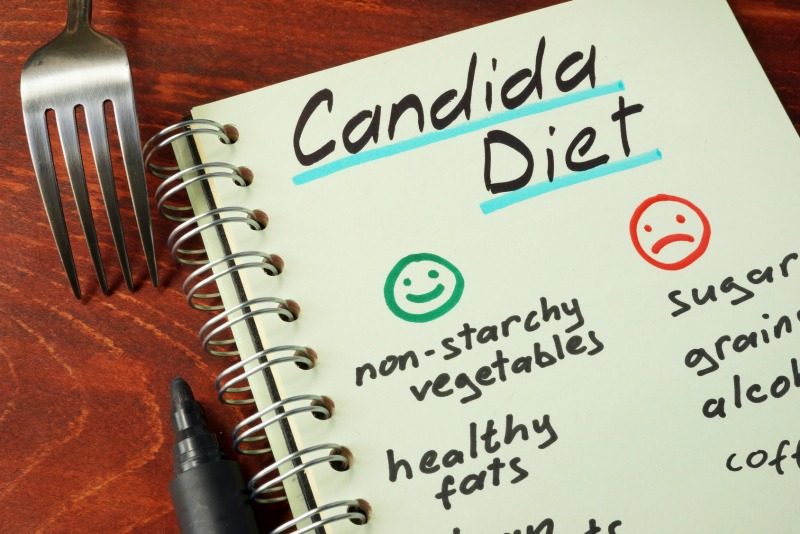These days it feels like there are a thousand elimination diets out there that will cure every ailment from migraines to acne. Now, the Candida Diet is taking on yeast.
Candida is a type of yeast that lives in your mouth and gut or on your skin. This yeast is a normal part of your body’s environment (particularly in the gut), but when levels get too high, candida can wreak havoc throughout your body, explains Dr Niket Sonpal, assistant clinical professor at the Touro School of Osteopathic Medicine in New York City.
Candida overgrowth has been linked to oral thrush (marked by white lesions in the mouth), sinus infections, fatigue, skin infections, UTIs, yeast infections and digestive issues such as Crohn’s, irritable bowel syndrome (IBS) and ulcerative colitis.
Candida overgrowth occurs when there’s an imbalance between the types of bacteria in your gut. And, while anything from your birth control to stress can throw off your body’s delicate balance of intestinal bacteria, most often, issues are due to the use of antibiotics.
After all, antibiotics are all about killing bacteria, and even if some forms of bacteria are bad, others are good – and responsible for regulating candida levels.
The question is, can altering your diet help keep candida in check? And is it even necessary?
What’s on the menu?
The Candida Diet, developed by Lisa Richards, a health researcher and self-proclaimed candida sufferer, and Eric Wood, a naturopathic doctor (neither responded to requests for comment), stresses that treating candida overgrowth requires three elements: probiotics, antifungals and, of course, diet.
Probiotics are used reintroduce the “good” bacteria into your system and rebalance your gut, while antifungals kill excessive fungal growth.
The diet itself starts with a “cleanse” that lasts for a few days to a week in order to prepare your body for the new style of eating. During that time, you can eat non-starchy vegetables, low-sugar fruits, healthy oils, herbs and spices, and organic eggs.
Then, you start eating according to the diet’s rules. In general, the diet encourages you to avoid high-sugar fruits, refined grains, meats such as pork and lunch meat, fish such as tuna and swordfish, some dairy products, mouldy nuts and seeds, condiments with added sugars, refined and processed vegetable oils, sugars and sugar substitutes, caffeinated or sugary drinks, and alcohol.
Instead, you should focus on eating non-starchy vegetables, low-sugar fruits, non-glutinous grains, healthy fats and lean protein.
Any food that’s highly processed, high in sugar, or quickly gets processed as sugar is a no-go on this diet. If it looks familiar, that’s because at its core, this is an anti-inflammation diet, similar to the Whole30. The idea is that foods that are high in sugar or simple carbs exacerbate the problem of candida overgrowth, while processed foods directly spike inflammation.
But what about pork chops, tuna and dairy? They aren’t processed or high in sugar, right?
"Pork contains retroviruses and parasites that may survive cooking and be harmful for those with a weakened digestive system. Also, remember that pork often comes in an over-cooked form (i.e. bacon!) that is full of carcinogenic compounds. Properly-cooked pork from a reputable source may be okay, but we would recommend avoiding it during your Candida Diet,” the diet’s website says.
Tuna and swordfish should be avoided because they contain metals and “other pollutants” due to the fact that they live longer and therefore spend more time in our polluted oceans. Meanwhile, the diet also dictates that there’s too much sugar in dairy, and it should be avoided.
Does it work?
“It’s true that yeasts thrive on sugars and refined carbohydrates,” says Dr Sonpal. “Many theories exist on the relationship between foods and yeast, and there are more anti-candida diets than can be counted.”
There’s no doubt that the fewer processed foods and less added sugar in your diet, the better, but that doesn’t mean the diet is a cure-all, he says.
“I’ve had over a dozen patients come to me with new diets for their IBS and, sadly, some of them get relief, others don’t, and no one is cured.”
After all, just because you have IBS or a UTI, it doesn’t mean that you have a candida problem.
“It’s difficult to say if this would cause a patient harm, but I would tell the patient to ensure they are getting a balanced diet and taking vitamin supplements if they plan to proceed with something drastic,” says Dr Sonpal. “Likewise, [it’s] hard to judge if there are many benefits to the idea, as there is no clinical data to support its use. When my patients present with new diets, I ask them to bring me a sample diet schematic of their meals and sit with them to make sure they aren’t hurting themselves through this diet. I would tell all patients if they plan to try [a diet] that is not supported by evidence based medicine, to simply have their doctor look it over and make a few shorter-interval, follow-up appointments.”
Plus, registered dietitians generally advise that you avoid anything that includes the word “cleanse”, as there’s no such diet that “cleanses” your system – the body is self-cleansing.
Your best move
Before you attack candida with everything you’ve got, talk to your doctor about any health issues that are troubling you, possible courses of treatment, and find out if candida’s even a problem for you.
For instance, if you find yourself suffering yeast infections when prescribed antibiotics, share that with your doctor and they’ll likely put you on an a probiotic regimen to combat the antibiotics’ effects.
Dr Sonpal says he typically advises these patients get four to six serving of probiotics a day, whether through food like kimchi and yogurt, or through supplements.
If you’re considering finding resolution through diet changes, it’s best to talk to your doctor about tailoring your diet to a low-FODMAP diet, which has been proven to help patients with IBS, says Dr Sonpal.
Fuente: www.health24.com
